- DTC judgment completed
- System normal
| Last Modified: 09-10-2025 | 6.11:8.1.0 | Doc ID: RM100000001R2GX |
| Model Year Start: 2021 | Model: Avalon | Prod Date Range: [08/2020 - ] |
| Title: A25A-FKS (ENGINE CONTROL): SFI SYSTEM: P212012,P212014,P21201C,P21201F,P212099,P212512,P212514,P21251F,P21382B; Throttle/Pedal Position Sensor/Switch "D" Circuit Short to Battery; 2021 - 2022 MY Avalon [08/2020 - ] | ||
|
DTC |
P212012 |
Throttle/Pedal Position Sensor/Switch "D" Circuit Short to Battery |
|
DTC |
P212014 |
Throttle/Pedal Position Sensor/Switch "D" Circuit Short to Ground or Open |
|
DTC |
P21201C |
Throttle/Pedal Position Sensor/Switch "D" Circuit Voltage Out of Range |
|
DTC |
P21201F |
Throttle/Pedal Position Sensor/Switch "D" Circuit Intermittent |
|
DTC |
P212099 |
Throttle/Pedal Position Sensor/Switch "D" Exceeded Learning Limit |
|
DTC |
P212512 |
Throttle/Pedal Position Sensor/Switch "E" Circuit Short to Battery |
|
DTC |
P212514 |
Throttle/Pedal Position Sensor/Switch "E" Circuit Short to Ground or Open |
|
DTC |
P21251F |
Throttle/Pedal Position Sensor/Switch "E" Circuit Intermittent |
|
DTC |
P21382B |
Throttle/Pedal Position Sensor/Switch "D"/"E" Voltage Correlation Signal Cross Coupled |
DESCRIPTION
HINT:
These DTCs relate to the accelerator pedal position sensor.
The accelerator pedal position sensor is built into the accelerator pedal sensor assembly and has 2 sensor circuits: VPA (main) and VPA2 (sub). This sensor is a non-contact type sensor and uses Hall-effect elements in order to yield accurate signals even in extreme driving conditions, such as at high speeds as well as very low speeds. The voltage, which is applied to terminals VPA and VPA2 of the ECM, varies between 0.5 V and 4.75 V in proportion to the operating angle of the accelerator pedal (throttle valve). A signal from VPA indicates the actual accelerator pedal opening angle (throttle valve opening angle) and is used for engine control. A signal from VPA2 conveys the status of the VPA circuit and is used to check the accelerator pedal position sensor itself.
The ECM monitors the actual accelerator pedal opening angle (throttle valve opening angle) through the signals from VPA and VPA2, and controls the throttle actuator according to these signals.
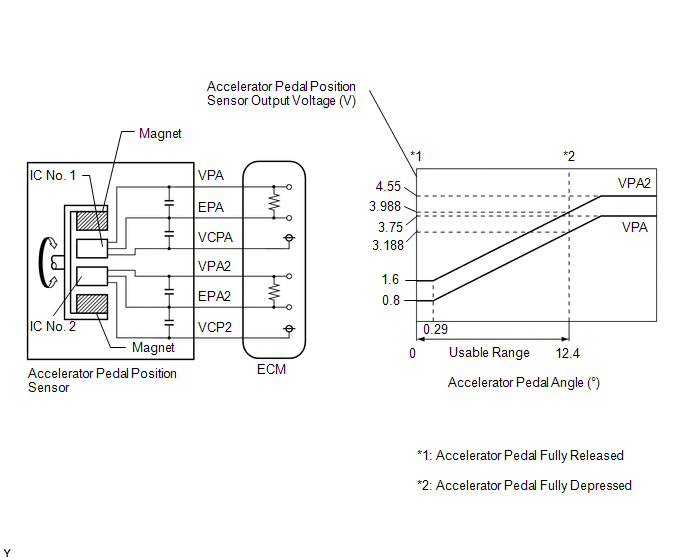
|
DTC No. |
Detection Item |
DTC Detection Condition |
Trouble Area |
MIL |
Memory |
Note |
|---|---|---|---|---|---|---|
|
P212012 |
Throttle/Pedal Position Sensor/Switch "D" Circuit Short to Battery |
VPA is 4.8 V or higher for 2 seconds or more (1 trip detection logic). |
|
Comes on |
DTC stored |
SAE Code: P2123 |
|
P212014 |
Throttle/Pedal Position Sensor/Switch "D" Circuit Short to Ground or Open |
VPA is 0.4 V or less for 0.5 seconds or more when the accelerator pedal is depressed (1 trip detection logic). |
|
Comes on |
DTC stored |
SAE Code: P2122 |
|
P21201C |
Throttle/Pedal Position Sensor/Switch "D" Circuit Voltage Out of Range |
Difference between VPA and VPA2 is greater than or equal to the specified value for 0.5 seconds (1 trip detection logic). |
|
Comes on |
DTC stored |
SAE Code: P2121 |
|
P21201F |
Throttle/Pedal Position Sensor/Switch "D" Circuit Intermittent |
VPA fluctuates rapidly beyond the upper and lower malfunction thresholds for 0.5 seconds or more (1 trip detection logic). |
|
Comes on |
DTC stored |
SAE Code: P2120 |
|
P212099 |
Throttle/Pedal Position Sensor/Switch "D" Exceeded Learning Limit |
Difference between VPA and VPA2 is less than 0.4 V, or higher than 1.2 V (learned value of accelerator off position) (1 trip detection logic). |
|
Comes on |
DTC stored |
SAE Code: P2121 |
|
P212512 |
Throttle/Pedal Position Sensor/Switch "E" Circuit Short to Battery |
Both of the following conditions are met for 2 seconds or more (1 trip detection logic): (a) VPA2 is 4.8 V or higher. (b) VPA is between 0.4 V and 3.45 V. |
|
Comes on |
DTC stored |
SAE Code: P2128 |
|
P212514 |
Throttle/Pedal Position Sensor/Switch "E" Circuit Short to Ground or Open |
VPA2 is 1.2 V or less for 0.5 seconds or more when the accelerator pedal is depressed (1 trip detection logic). |
|
Comes on |
DTC stored |
SAE Code: P2127 |
|
P21251F |
Throttle/Pedal Position Sensor/Switch "E" Circuit Intermittent |
VPA2 fluctuates rapidly beyond the upper and lower malfunction thresholds for 0.5 seconds or more (1 trip detection logic). |
|
Comes on |
DTC stored |
SAE Code: P2125 |
|
P21382B |
Throttle/Pedal Position Sensor/Switch "D"/"E" Voltage Correlation Signal Cross Coupled |
Difference between VPA and VPA2 is 0.02 V or less for 2.0 seconds or more (1 trip detection logic): |
|
Comes on |
DTC stored |
SAE Code: P2138 |
HINT:
When any of these DTCs are output, check the accelerator pedal position sensor voltage using the Techstream. Enter the following menus: Powertrain / Engine / Data List / Accelerator Position Sensor No.1 Voltage and Accelerator Position Sensor No.2 Voltage.
|
Trouble Area |
Accelerator Pedal Fully Released |
Accelerator Pedal Fully Depressed |
||
|---|---|---|---|---|
|
Accelerator Position Sensor No.1 Voltage |
Accelerator Position Sensor No.2 Voltage |
Accelerator Position Sensor No.1 Voltage |
Accelerator Position Sensor No.2 Voltage |
|
|
Open in VC circuit |
0 to 0.2 V |
0 to 0.2 V |
0 to 0.2 V |
0 to 0.2 V |
|
Open or ground short in VPA circuit |
0 to 0.2 V |
1.2 to 2.0 V |
0 to 0.2 V |
3.4 to 4.75 V |
|
Open or ground short in VPA2 circuit |
0.5 to 1.1 V |
0 to 0.2 V |
2.6 to 4.5 V |
0 to 0.2 V |
|
Open in EPA circuit |
4.5 to 4.98 V |
4.5 to 4.98 V |
4.5 to 4.98 V |
4.5 to 4.98 V |
|
Normal condition |
0.5 to 1.1 V |
1.2 to 2.0 V |
2.6 to 4.5 V |
3.4 to 4.75 V |
HINT:
Accelerator pedal positions are expressed as voltages.
MONITOR DESCRIPTION
When either output voltage of VPA or VPA2 deviates from the standard range, or the difference between the output voltages of the 2 sensor circuits exceeds the upper or lower threshold, the ECM determines that there is a malfunction in the accelerator pedal position sensor. The ECM then illuminates the MIL and stores a DTC.
Example:
When the output voltage of VPA is 0.4 V or less for 0.5 seconds or more when the accelerator pedal is fully depressed, DTC P212014 is stored.
MONITOR STRATEGY
|
Related DTCs |
P2120: Accelerator pedal position sensor 1 range check (chattering) P2121: Accelerator pedal position sensor rationality P2122: Accelerator pedal position sensor 1 range check (low voltage) P2123: Accelerator pedal position sensor 1 range check (high voltage) P2125: Accelerator pedal position sensor 2 range check (chattering) P2127: Accelerator pedal position sensor 2 range check (low voltage) P2128: Accelerator pedal position sensor 2 range check (high voltage) P2138: Accelerator pedal position sensor range check (correlation) |
|
Required Sensors/Components (Main) |
Accelerator pedal sensor assembly |
|
Required Sensors/Components (Related) |
- |
|
Frequency of Operation |
Continuous |
|
Duration |
-: P2121 (case 1) 0.5 seconds: P2120, P2121 (case 2), P2122, P2125 and P2127 2.0 seconds: P2123, P2128 and P2138 |
|
MIL Operation |
Immediate |
|
Sequence of Operation |
None |
TYPICAL ENABLING CONDITIONS
P2120, P2122, P2123, P2125, P2127, P2128 and P2138
|
Monitor runs whenever the following DTCs are not stored |
None |
P2121
|
Accelerator pedal position sensor circuit fail (P2120, P2122, P2123, P2125, P2127, P2128, P2138) |
Not detected |
TYPICAL MALFUNCTION THRESHOLDS
P2120
|
Either of the following conditions is met |
1 or 2 |
|
1. VPA voltage |
0.4 V or less |
|
2. VPA voltage |
4.8 V or higher |
P2121: (Case 1)
|
Difference between VPA voltage and VPA2 voltage (learned value of accelerator off position) |
Less than 0.4 V, or higher than 1.2 V |
P2121: (Case 2)
|
All of the following conditions are met |
- |
|
[(VPA voltage - Learned VPA accelerator off position voltage) - (VPA2 voltage - Learned VPA2 accelerator off position voltage)] |
0.165 V or higher (varies with accelerator position) |
|
VPA2 voltage |
Less than 4.84 V |
|
Either of following conditions is met: |
(a) or (b) |
|
(a) VPA voltage - Learned VPA accelerator off position voltage |
0.04 V or higher |
|
(b) VPA2 voltage - Learned VPA2 accelerator off position voltage |
0.04 V or higher |
P2122
|
VPA voltage |
0.4 V or less |
P2123
|
VPA voltage |
4.8 V or higher |
P2125
|
Either of the following conditions is met |
1 or 2 |
|
1. VPA2 voltage |
1.2 V or less |
|
2. VPA2 voltage when VPA voltage 0.4 to 3.45 V |
4.8 V or higher |
P2127
|
VPA2 voltage |
1.2 V or less |
P2128
|
VPA2 voltage when VPA voltage 0.4 to 3.45 V |
4.8 V or higher |
P2138
|
Difference between VPA and VPA2 voltages |
0.02 V or less |
CONFIRMATION DRIVING PATTERN
HINT:
P212012, P212014, P21201F, P212512, P212514, P21251F and P21382B
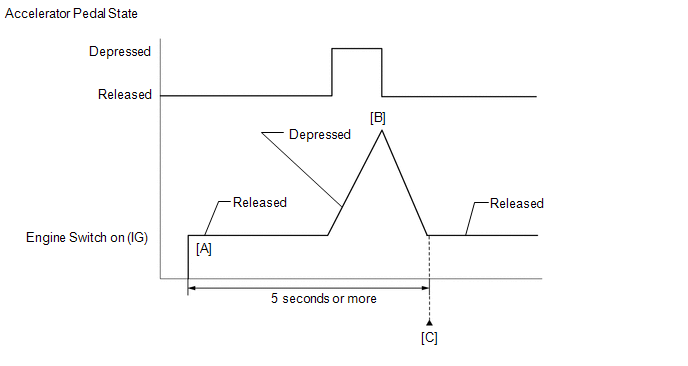
- Connect the Techstream to the DLC3.
- Turn the engine switch on (IG).
- Turn the Techstream on.
- Clear the DTCs (even if no DTCs are stored, perform the clear DTC procedure).
- Turn the engine switch off and wait for at least 30 seconds.
- Turn the engine switch on (IG) [A].
- Turn the Techstream on.
- Fully depress and release the accelerator pedal [B].
- Check that 5 seconds or more have elapsed since the engine switch is on (IG).
- Enter the following menus: Powertrain / Engine / Trouble Codes [C].
-
Read the pending DTCs.
HINT:
- If a pending DTC is output, the system is malfunctioning.
- If a pending DTC is not output, perform the following procedure.
- Enter the following menus: Powertrain / Engine / Utility / All Readiness.
- Input the DTC: P212012, P212014, P21201F, P212512, P212514, P21251F or P21382B.
-
Check the DTC judgment result.
Techstream Display
Description
NORMAL
ABNORMAL
- DTC judgment completed
- System abnormal
INCOMPLETE
- DTC judgment not completed
- Perform driving pattern after confirming DTC enabling conditions
HINT:
- If the judgment result is NORMAL, the system is normal.
- If the judgment result is ABNORMAL, the system is malfunctioning.
- If the judgment result is INCOMPLETE, perform steps [B] through [C] again.
-
[A] to [C]: Normal judgment procedure.
The normal judgment procedure is used to complete DTC judgment and also used when clearing permanent DTCs.
- When clearing the permanent DTCs, do not disconnect the cable from the battery terminal or attempt to clear the DTCs during this procedure, as doing so will clear the universal trip and normal judgment histories.
P21201C and P212099
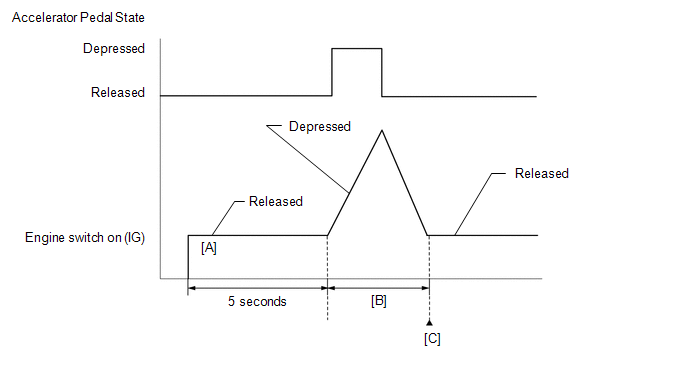
- Connect the Techstream to the DLC3.
- Turn the engine switch on (IG).
- Turn the Techstream on.
- Clear the DTCs (even if no DTCs are stored, perform the clear DTC procedure).
- Turn the engine switch off and wait for at least 30 seconds.
- Turn the engine switch on (IG) [A].
- Turn the Techstream on.
- Wait for 5 seconds after turning the engine switch is on (IG).
-
Operate the accelerator pedal in accordance with the following procedure [B].
- Enter the following menus: Powertrain / Engine / Data List / Accelerator Position Sensor No.1 Voltage % and Accelerator Position Sensor No.2 Voltage %.
- Slowly depress the accelerator pedal until Accelerator Position Sensor No.1 Voltage % is approximately 30% and Accelerator Position Sensor No.2 Voltage % is approximately 46%, then slowly release the accelerator pedal.
- Enter the following menus: Powertrain / Engine / Trouble Codes [C].
-
Read the pending DTCs.
HINT:
- If a pending DTC is output, the system is malfunctioning.
- If a pending DTC is not output, perform the following procedure.
- Enter the following menus: Powertrain / Engine / Utility / All Readiness.
- Input the DTC: P21201C or P212099.
-
Check the DTC judgment result.
Techstream Display
Description
NORMAL
- DTC judgment completed
- System normal
ABNORMAL
- DTC judgment completed
- System abnormal
INCOMPLETE
- DTC judgment not completed
- Perform driving pattern after confirming DTC enabling conditions
HINT:
- If the judgment result is NORMAL, the system is normal.
- If the judgment result is ABNORMAL, the system is malfunctioning.
- If the judgment result is INCOMPLETE, perform steps [B] through [C] again.
-
[A] to [C]: Normal judgment procedure.
The normal judgment procedure is used to complete DTC judgment and also used when clearing permanent DTCs.
- When clearing the permanent DTCs, do not disconnect the cable from the battery terminal or attempt to clear the DTCs during this procedure, as doing so will clear the universal trip and normal judgment histories.
FAIL-SAFE
When these DTCs are stored, the ECM enters fail-safe mode. During fail-safe mode, the ECM cuts the current to the throttle actuator, and the throttle valve is returned to a 7.5° throttle valve opening angle by the return spring. The ECM then adjusts the engine output by controlling the fuel injection (intermittent fuel-cut) and ignition timing, in accordance with the accelerator pedal opening angle, to allow the vehicle to continue running at a minimal speed. If the accelerator pedal is depressed firmly and gently, the vehicle can be driven slowly.
Fail-safe mode continues until a pass condition is detected, and the engine switch is turned off.
WIRING DIAGRAM
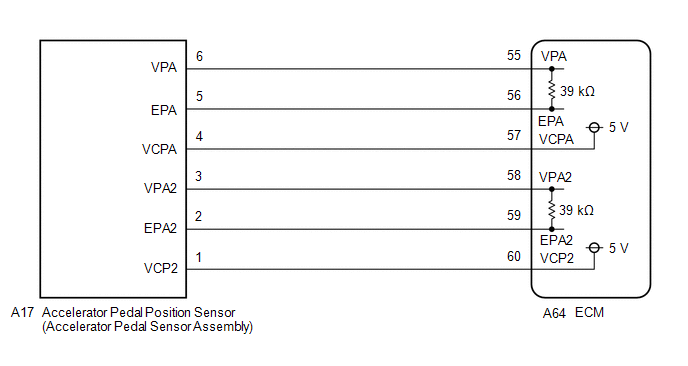
CAUTION / NOTICE / HINT
HINT:
Read Freeze Frame Data using the Techstream. The ECM records vehicle and driving condition information as Freeze Frame Data the moment a DTC is stored. When troubleshooting, Freeze Frame Data can help determine if the vehicle was moving or stationary, if the engine was warmed up or not, if the air fuel ratio was lean or rich, and other data from the time the malfunction occurred.
PROCEDURE
PROCEDURE
|
1. |
READ VALUE USING TECHSTREAM (ACCELERATOR PEDAL POSITION SENSOR) |
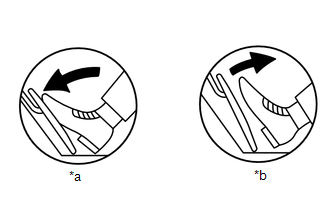
|
*a |
Fully Depressed |
|
*b |
Fully Released |
(a) Connect the Techstream to the DLC3.
(b) Turn the engine switch on (IG).
(c) Turn the Techstream on.
(d) Enter the following menus: Powertrain / Engine / Data List / Accelerator Position Sensor No.1 Voltage and Accelerator Position Sensor No.2 Voltage.
Powertrain > Engine > Data List
|
Tester Display |
|---|
|
Accelerator Position Sensor No.1 Voltage |
|
Accelerator Position Sensor No.2 Voltage |
(e) Read the value displayed on the Techstream.
Standard Voltage:
|
Accelerator Pedal Operation |
Accelerator Position Sensor No.1 Voltage |
Accelerator Position Sensor No.2 Voltage |
Difference between Accelerator Position Sensor No.1 Voltage and Accelerator Position Sensor No.2 Voltage |
|---|---|---|---|
|
Fully Released |
0.5 to 1.1 V |
1.2 to 2.0 V |
More than 0.02 V |
|
Fully Depressed |
2.6 to 4.5 V |
3.4 to 4.75 V |
| OK |

|
| NG |

|
|
2. |
CHECK TERMINAL VOLTAGE (POWER SOURCE OF ACCELERATOR PEDAL SENSOR ASSEMBLY) |
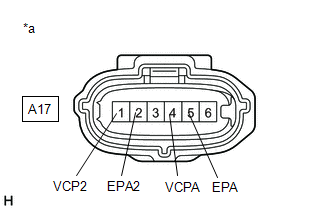
|
*a |
Front view of wire harness connector (to Accelerator Pedal Sensor Assembly) |
HINT:
Make sure that the connector is properly connected. If it is not, securely connect it and check for DTCs again.
(a) Disconnect the accelerator pedal sensor assembly connector.
(b) Turn the engine switch on (IG).
(c) Measure the voltage according to the value(s) in the table below.
Standard Voltage:
|
Tester Connection |
Condition |
Specified Condition |
|---|---|---|
|
A17-4 (VCPA) - A17-5 (EPA) |
Engine switch on (IG) |
4.5 to 5.5 V |
|
A17-1 (VCP2) - A17-2 (EPA2) |
Engine switch on (IG) |
4.5 to 5.5 V |
| NG |

|
|
|
3. |
CHECK HARNESS AND CONNECTOR (RESISTANCE OF ECM) |
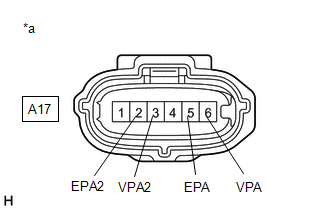
|
*a |
Front view of wire harness connector (to Accelerator Pedal Sensor Assembly) |
(a) Disconnect the accelerator pedal sensor assembly connector.
(b) Measure the resistance according to the value(s) in the table below.
Standard Resistance:
|
Tester Connection |
Condition |
Specified Condition |
|---|---|---|
|
A17-6 (VPA) - A17-5 (EPA) |
Engine switch off |
37.05 to 40.95 kΩ |
|
A17-3 (VPA2) - A17-2 (EPA2) |
Engine switch off |
37.05 to 40.95 kΩ |
| OK |

|
| NG |

|
|
4. |
CHECK HARNESS AND CONNECTOR (ACCELERATOR PEDAL SENSOR ASSEMBLY - ECM) |
(a) Disconnect the accelerator pedal sensor assembly connector.
(b) Disconnect the ECM connector.
(c) Measure the resistance according to the value(s) in the table below.
Standard Resistance:
|
Tester Connection |
Condition |
Specified Condition |
|---|---|---|
|
A17-6 (VPA) - A64-55 (VPA) |
Always |
Below 1 Ω |
|
A17-5 (EPA) - A64-56 (EPA) |
Always |
Below 1 Ω |
|
A17-3 (VPA2) - A64-58 (VPA2) |
Always |
Below 1 Ω |
|
A17-2 (EPA2) - A64-59 (EPA2) |
Always |
Below 1 Ω |
|
A17-6 (VPA) or A64-55 (VPA) - Body ground and other terminals |
Always |
10 kΩ or higher |
|
A17-5 (EPA) or A64-56 (EPA) - Body ground and other terminals |
Always |
10 kΩ or higher |
|
A17-3 (VPA2) or A64-58 (VPA2) - Body ground and other terminals |
Always |
10 kΩ or higher |
|
A17-2 (EPA2) or A64-59 (EPA2) - Body ground and other terminals |
Always |
10 kΩ or higher |
| OK |

|
| NG |

|
REPAIR OR REPLACE HARNESS OR CONNECTOR |
|
5. |
CHECK HARNESS AND CONNECTOR (ACCELERATOR PEDAL SENSOR ASSEMBLY - ECM) |
(a) Disconnect the accelerator pedal sensor assembly connector.
(b) Disconnect the ECM connector.
(c) Measure the resistance according to the value(s) in the table below.
Standard Resistance:
|
Tester Connection |
Condition |
Specified Condition |
|---|---|---|
|
A17-4 (VCPA) - A64-57 (VCPA) |
Always |
Below 1 Ω |
|
A17-5 (EPA) - A64-56 (EPA) |
Always |
Below 1 Ω |
|
A17-1 (VCP2) - A64-60 (VCP2) |
Always |
Below 1 Ω |
|
A17-2 (EPA2) - A64-59 (EPA2) |
Always |
Below 1 Ω |
|
A17-4 (VCPA) or A64-57 (VCPA) - Body ground and other terminals |
Always |
10 kΩ or higher |
|
A17-5 (EPA) or A64-56 (EPA) - Body ground and other terminals |
Always |
10 kΩ or higher |
|
A17-1 (VCP2) or A64-60 (VCP2) - Body ground and other terminals |
Always |
10 kΩ or higher |
|
A17-2 (EPA2) or A64-59 (EPA2) - Body ground and other terminals |
Always |
10 kΩ or higher |
| OK |

|
| NG |

|
REPAIR OR REPLACE HARNESS OR CONNECTOR |
|
|
|
![2021 - 2022 MY Avalon [08/2020 - ]; A25A-FKS (ENGINE CONTROL): SFI SYSTEM: DTC CHECK / CLEAR](/t3Portal/stylegraphics/info.gif)
